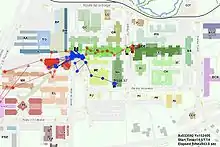Location-based game
A location-based game (or location-enabled game) is a type of pervasive game in which the gameplay evolves and progresses via a player's location. Thus, location-based games must provide some mechanism to allow the player to report their location, frequently this is through some kind of localization technology, for example by using satellite positioning through GPS. "Urban gaming" or "street games" are typically multi-player location-based games played out on city streets and built up urban environments. Various mobile devices can be used to play location-based games; these games have been referred to as "location-based mobile games",[1] merging location-based games and mobile games.

Some games have used embedded mobile technologies such as near field communication, Bluetooth, and UWB. Poor technology performance in urban areas has led some location-based games to incorporate disconnectivity as a gameplay asset
Organizations
In 2006, Penn State students founded the Urban Gaming Club. The goal of the club is to provide location-based games and Alternate Reality Games. Some of the games played by Penn State's UGC are Humans vs. Zombies, Manhunt, Freerunning and Capture the Flag. Students at other American universities have formed similar organizations, such as the Zombie Outbreak Management Facilitation Group at Cornell College.
Learning
Location-based games may induce learning. De Souza, (2006)[2] has observed that these activities produce learning that is social, experiential and situated. Learning however is related to the objectives of the game designers. In a survey of location-based games (Avouris & Yiannoutsou, 2012)[3] it was observed that in terms of the main objective, these games may be categorized as ludic,(e.g. games that are created for fun), pedagogic, (e.g. games created mainly for learning), and hybrid,(e.g. games with mixed objectives). The ludic group, are to a large extent action oriented, involving either shooting, action or treasure hunt type of activities. These are weakly related to a narrative and a virtual world. However, the role-playing version of these games seem to have a higher learning potential, although this has yet to be confirmed through more extended empirical studies. On the other hand, the social interaction that takes place and skills related to strategic decisions, observation, planning, physical activity are the main characteristics of this strand in terms of learning. The pedagogic group of games involve participatory simulators, situated language learning and educational action games. Finally the hybrid games are mostly museum location-based games and mobile fiction, or city fiction.
Legalities
The nature of location-based gaming may mean that certain real-world locations will be visited by higher-than-normal numbers of people who are playing the game, which generally has been received favorably by nearby attractions or local businesses. However, these games may generate activity at locations that are privately-owned or have access limits, or otherwise cause undesirable congestion. Pokémon Go notably has several publicized events of players being drawn to inappropriate locations for the game, requiring the developer to manually remove these areas from the game.[4][5][6] In one of the first legal challenges for location-based gaming, a Federal District court ruled that a Wisconsin county ordinance to require game developers of such location-based games to get appropriate permits to allow locations in the county's public park systems was likely unconstitutional. While the county had felt there was no First Amendment rights involved due to how locations were generated in-game, the Federal judge disagreed.[7]
Notable examples
See also
- Alternate reality game
- Encounter (game)
- Entertainment district
- fAR-Play, a location-based game platform
- Location-based service
- Mixed reality game
- mscape, a location-based game platform.
- Pervasive game
- Sentient computing
- Transreality gaming
- Ubiquitous computing
References
- von Borries, Friedrich; Walz, Steffen P.; Böttger, Matthias, eds. (2007), "BotFighters: A Game That Surrounds You", Space Time Play, Basel, Boston, Berlin: Birkhäuser Verlag AG, pp. 226–227, ISBN 978-3-7643-8414-2
- De Souza, E Silva; G. C Delacruz (July 2006). "Hybrid Reality Games Reframed Potential Uses in Educational Contexts". Games and Culture. 1 (3): 231–251. doi:10.1177/1555412006290443.
- Avouris, N; Yiannoutsou N. (2012). "A review of mobile location-based games for learning across physical and virtual spaces". Journal of Universal Computer Science. 18.
- Velloso, Eduardo; Carter, Marcus. "Some places should be off limits for games such as Pokémon GO". The Conversation. Retrieved July 13, 2016.
- "Holocaust Museum, Auschwitz want Pokémon Go hunts out". USA Today. Retrieved July 13, 2016.
- Phillips, Tom (July 12, 2016). "Holocaust museum pleads: stop playing Pokémon Go here". Eurogamer. Retrieved July 13, 2016.
- Kravets, David (July 20, 2017). "Augmented reality wins big in 1st Amendment legal flap". Ars Technica. Retrieved July 20, 2017.
External links
- Bullerdiek, Sönke: Design and Evaluation of Pervasive Games, Thesis (de) 2006
- Gamers turn cities into a battleground - article on urban gaming from New Scientist
- Dreher, Thomas: Pervasive Games: Interfaces, Strategies and Moves
- Encyclopedia of Location-Based Games - dasbox.be. List of (mostly) GPS games and short comments. Archived from the original on 2 February 2017. Retrieved 13 September 2019.
